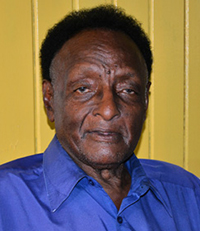THE Guyana Court of Appeal in 1967 allowed an appeal and quashed a conviction and sentence of accused Mintra Chand, because the trial judge considered Chand’s silence to be indicative of guilt.
At the jury trial, the jury acting on the misdirection of the judge found the accused guilty resulting in him being sentenced to 2 years imprisonment. He appealed.
Justice of Appeal Edward Luckhoo who along with justices of appeal Guya Persaud and P.A. Cummings, constituted the Appellate
Court.
Justice of Appeal Luckhoo delivered the judgment. The other judges concurred to the judgment, that allowed the appeal, and quashed the conviction and sentence.
The trial judge had taken into account that when challenged by the police about the alleged robbery, the accused after being cautioned was told by the policeman that he was not obliged to say anything , unless he wished to dos so.
Acting accordingly, the accused said that he did not have anything to say, except to say that he did not know what the virtual complainant was talking about. The appellant for he first time gave a statement from the dock indicating that he and the virtual complainant had a fight that night relative to an allegation abut a stolen fowl.
The trial judge, not taking into account that the caution, gave a prisoner the right to remain silent was critical about the accused’s statement from the dock and pointed out to the jury that if what he was saying from the dock was true, he would have related that in his statement to the police in the first instance.
That was a misdirection which the jury accepted in coming to their conclusion of guilt, the Appellate Court found.
The facts disclosed that the appellant was cautioned by a policeman in the presence of B whom it was alleged himself and another man had robbed two days previously.
After the appellant was cautioned he said “I don’t know anything about that”
In his statement to the Police the appellant alleged that at the relevant date and time he was at a nearby cinema with another man and denied robbing B.
In his statement from the dock at his trial in the High Court the appellant said that himself and B had a fight in front of the cinema which his friend had parted.’
The trial judge failed to remind the jury that when a person is cautioned he is not obliged to say anything and he told the jury that one would have expected that the appellant would have told the police about the fight which the jury were hearing for the first time and that such an incident might have been a motive why B had made a false allegation against him.
The Appellate Court held:-
(i) It is not always that “silence is golden”: a Judge may properly, in certain circumstances, invite a jury to consider an accused person’s silence as a relevant factor in determining what weight should be given to any defence which he may subsequently raise, but it would amount to a misdirection were he to invite them to treat the accused’s silence as evidence against him;
(ii) To avoid the danger of depriving an accused person of the protection which he has a right to expect from the implication of the words ‘that he not obliged to say anything contained in the caution it may well be that where an accused person makes no answer at all or makes some observation which in itself is not in the matter of an explanation, then the trial judge should make no observation . on it;
(iii) here, the trial Judge’s directions clearly offended these principles and the result of his drastic and destructive comments made it difficult for the jury to resist coming to the conclusion that because the story of the fight was not told at the first opportunity it could not be true, was not in fact true, ought not to be believed and should be discarded. Such comments could not be described as fair and proper and did not take cognisance of the paramount importance of not allowing the usual police caution to become a rap to the unwary.
Appeal allowed- Convictions snd sentence quashed, the Guyana Court of Appeal ruled.
According tp President of the Appellate Court Edward Luckho, ”The appellant Chand and another man, Mahadeo Sukdeo, were convicted on the12th January 1967, for the offence of robbery with violence, contrary to section 222(a) of the Criminal Law (Offences) Ordinance, Chapter 10, for which they were sentenced io two years and eighteen months, respectively, and from which they both appealed, but the latter, somewhat unfortunately (in view of the conclusion at which we have arrived ) chose to abandon his appeal before hearing .
No doubt his position will be reviewed by those charged with that responsibility to allow him to have, in justice, the benefit of what the appellant herein has derived from this decision.




.png)









